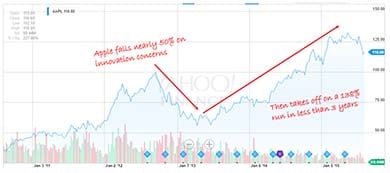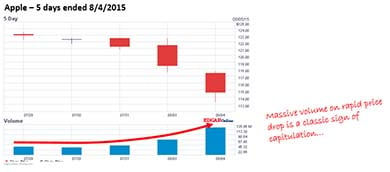Apple Inc.'s (Nasdaq: AAPL) stock price lost another 3.2% on Tuesday, Aug. 4 on more than double the usual volume, making many investors wonder if it's time to throw in the proverbial towel. It finished the day down 14% from the $133 a share high it set in February, and paper losses now tally $133.4 billion.
To put that in perspective, Apple's just lost more than McDonald's, which carries a $95 billion market cap, is worth.
I can't help but think this is great.
Stocks like Apple rarely, if ever, take a break like this. That means you've got one whale of an opportunity on your hands, and a unique chance to buy in when everybody is running the other way.
Today we're going to talk about why...
The secret is capitulation - and it could mean a double-digit discount for you in one of the most promising sectors in the world.
There's no question that Apple has taken a beating in recent trading. The stock dropped another 3.2% and closed Tuesday at only $114.64 a share after five consecutive days of selling. Yesterday, in particular, was a blood bath on roughly double the average daily volume.
Ostensibly, the story is about weakening demand in China, which is one of Apple's biggest markets, and the burden of higher expectations associated with iPhone and smartwatch sales that have fallen short of analyst projections.
We've talked about both of these things before. China is no more going to disappear than America is, and Wall Street analysts rarely get it "right."
So you owe it to yourself to keep things in perspective.
Besides, we've seen this playbook before. The stock's current slump is nowhere near as bad as the one three years ago, when Apple stock fell nearly 50% on concerns that the company had run out of clever ideas and was being eaten alive by the competition in both the smartphone and tablet markets that it created. If you do the math, that works out to a split-adjusted fall from grace at $100.72 in September 2012 to $55.01 by April 2013. Yet Apple was on track and climbing steadily again by June.

Click to Enlarge
My point is that healthy companies have give and take. Apple has, in fact, fallen below its 200-day moving average 17 times and, in each case, it's taken about 30 days to get back on its feet.
The way I see it, the current pull-back isn't unexpected right now, for three reasons I laid out to FOX Business anchor Deirdre Bolton last night on "Risk & Reward:"
- Apple makes up roughly 4% of the Dow, 12% of the Nasdaq, and 3.6% of the S&P 500. So it tracks the indices pretty closely, perhaps even drives them. There's probably some institutional profit-taking, rebalancing, and indexing going on, too.
- Apple is one of the most widely held stocks in the world and, chances are, if you've got any sort of retirement plan whatsoever, you own it. That means it's going to move on individual whim.
- Yesterday's rout on roughly double the normal average daily volume smells like capitulation, something we haven't seen in a while.
Ergo, Apple may be a great "Buy" at these levels. No, scratch that. Apple is a great buy at these levels. Three to five years from now, the current drop is going to be nothing more than a blip.
Fundamentally, this makes a lot of sense if you think about it...
Apple has a long history of creating devices that fill needs people don't even understand they have... then turning them into industry standards. That means the iPhone and tablet sales everybody is fixated on now are nothing more than a delivery mechanism and Jobs' legacy.
Current CEO Tim Cook has made a brilliant pivot into something I've termed the ecosphere. Very few people understand the vision, but it's one that revolves around a product set that hasn't yet been priced in and products that aren't yet on the market.
I'm thinking here about things like Apple Pay, Apple powered cars, TVs, even buildings, artificial intelligence, and form factors that haven't been invented yet but which you can bet are already on Apple's drawing board.
As for the notion that the watch is a dud... so what. I don't know a serious trader or investor who thought it was going to be a winner. The thing was a dud from day one, so the market has never priced that in to begin with.
Apple Stock Price Has Hit an Inflection Point - Just Not the Kind Panicked Sellers Believe
The real value in products like the watch is in the conversation with consumers who are gradually being led to Star Trek-style communicators that will transcend the smartphones, tablets, wallets, and wearable tech we think about today.
We have an aging population that increasingly prefers the simplicity of Apple designs over Droid. So the upgrade path is assured as long as Apple remains true to its design ethos.
And finally, Apple's probably going to grow revenue and earnings by 25% to 35% a year for the next five to 10 years. That's rarified air in today's stimulus-laden, politically charged environment.
But that still doesn't answer the question of why make your move now, nor the question of how. For that we need to return to the trading itself.
To hear the bears tell it, the selling is so severe that Apple has dropped below not one, but two critical measures. It's now trading below the 200-day moving average many institutions use as a line in the sand to judge momentum. And, according to Bespoke Research, Apple is farther below its 50-day moving average than it's been in the past 12 years.
That sounds bad, but here's the thing... When there's this much duress and this much pressure, you're bound to get mispricing. That's where something called "capitulation" comes in.
If you've never heard the term before, capitulation is a technical trading condition that reflects a shift in psychology that's really a reflection of investors who give up. It's often a key inflection point characterized by increasingly panicked selling that is much like the crescendo in music... a sharp loud burst.
You can see that very clearly in Apple at the moment. Price has dropped precipitously and volume has spiked to roughly double the most recent average daily levels.

Click to Enlarge
Most investors are in such a rush to sell that they fail to recognize that capitulations are frequently a sign that the bottom is at hand or close to it, because everybody who wants to sell has already sold.
This Simple Tactic Can Mean Double-Digit Discounts on Your Trades
Now, don't get me wrong. Capitulations are not a sign that you want to blindly buy in. Any company that suffers one could fall further before getting back on its feet, including Apple.
Instead, split your money into chunks that you use to buy Apple shares over the next three to five months using one of my favorite tactics: dollar-cost averaging.
What I like most about dollar-cost averaging is that it helps you avoid the neck-snapping volatility that plagues other investors, especially when it comes to a stock like Apple. It's also a great way to inject discipline into your investing process automatically, while also removing emotion from the equation.
And finally, dollar-cost averaging lessens the risk associated with buying a large amount of stock at the wrong time, because it helps you work with the markets, not against them.

Click to Enlarge
Over time, you'll actually accumulate more shares for less, yet still have all the upside you can handle...
Even if Apple's stock price drops for a sixth straight day.
Editor's Note: AAPL has a strong record of defying expectations over the years - but lightning-fast doubles are great, too. That's why Keith identified a stock that doubled within six weeks of his recommending it to Total Wealth readers - and he anticipates more quick gains for the little robotics company poised to take command of a $1.7 trillion trend. For a full and free report, including ticker symbol, sign up for Total Wealth here - completely free of charge.
About the Author
Keith is a seasoned market analyst and professional trader with more than 37 years of global experience. He is one of very few experts to correctly see both the dot.bomb crisis and the ongoing financial crisis coming ahead of time - and one of even fewer to help millions of investors around the world successfully navigate them both. Forbes hailed him as a "Market Visionary." He is a regular on FOX Business News and Yahoo! Finance, and his observations have been featured in Bloomberg, The Wall Street Journal, WIRED, and MarketWatch. Keith previously led The Money Map Report, Money Map's flagship newsletter, as Chief Investment Strategist, from 20007 to 2020. Keith holds a BS in management and finance from Skidmore College and an MS in international finance (with a focus on Japanese business science) from Chaminade University. He regularly travels the world in search of investment opportunities others don't yet see or understand.



